 This image (on the right) got shared about recently on Facebook. It looked like it came from a children’s book. Unsurprisingly, it generated a small tsunami of WTF! comments.
This image (on the right) got shared about recently on Facebook. It looked like it came from a children’s book. Unsurprisingly, it generated a small tsunami of WTF! comments.
Unsurprisingly too, a large number those comments were of the nature of anti-gay remarks (expletives, actually). Implicit behind some of those remarks was the assumption that the children’s book was published by some homosexual man in the hope of “softening” up targets — prepubescent boys.
See? This is what gay men get up to, the comments sort-of said. What more proof does one need of the danger of “gayism”?
It takes barely one minute and a few taps on a computer keyboard to discover that the truth behind that single image is the complete opposite, though the sad thing is that 99% of those so quick to comment on Facebook never bothered to search.
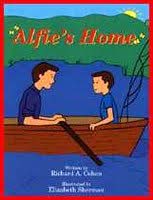 The illustration in question came from a book — indeed, a children’s book — titled Alfie’s Home, published in 1993 by Richard A Cohen and Elizabeth Sherman. In the book, the narrator is the boy himself, probably so that young readers can better identify with the story.
The illustration in question came from a book — indeed, a children’s book — titled Alfie’s Home, published in 1993 by Richard A Cohen and Elizabeth Sherman. In the book, the narrator is the boy himself, probably so that young readers can better identify with the story.
Here are some other pages from the book. By the end of it, it should be as clear as day what message the authors were trying to spread.
Everybody thinks we’re really happy, but I am not.
My dad is always working and when he’s at home, he screams a lot. That really hurts me.
Mom cries sometimes because she doesn’t know what to do. Then she holds me, telling me about her unhappiness and problems. It makes me feel very uncomfortable and strange.
I really wish my dad would spend time with me instead of screaming and yelling.
Uncle Pete comes over sometimes. He lives with us every now and then. He is really kind to me –holding me, listening to me, and making me feel loved.
One night, when he was holding me, he started touching my private parts. Over time, he taught me to touch and play with his. It felt very strange, scary and a little good too. He told me it was OK, that this means he really loves me. This went on for several months. He told me, “This is our special secret.”
Mom and Dad would fight. I thought they didn’t love me. Maybe they fought because of me?
When I became a teenager, I started feeling really different from the other guys. Some of them called me names like “Sissy,” “Faggot,” “Queer,” “Homo.” I didn’t know what they meant.
After awhile [sic], I went to a counselor for help and advice. I told him my story and that I thought I was gay.
He said I wasn’t gay. I just missed my Dad’s love and was taught wrong things by my uncle.
He said it was very bad what my uncle did to me. He should never have touched my private parts, or have me play with his. The counselor said it wasn’t my fault, that my uncle took advantage of my need for Dad’s love.
He explained that because I didn’t experience affection with my father, that now I was looking for closeness with other boys, to fill the need for my Dad’s love.
I felt so relieved. He said he would talk to my parents and help them understand. He said he would also contact Uncle Pete and made sure he got help.
The counselor explained to my Mom and Dad about my struggle and need for Dad’s love. He told them of my confusion about being gay. He told Dad that I needed his TIME, TOUCH and TALK.
Mom and Dad went to a counselor who helped them love each other more. They even stopped fighting. . . well, at least most of the time!
My counselor and I met with Uncle Pete. I told him how much he hurt me. He cried and asked me to forgive him.
That helped me a lot.
Now, I realize that I’m not gay.
Spending time with my Dad really healed my heart. All I needed was his time, touch and talk.
Finally, I am happy at home.
* * * * *
The whole premise of the story should now be crystal clear, and quite different from the initial impression. It is a piece of propaganda — not by a pro-gay lobby, but from anti-gay fanatics, aiming to plant the idea that gay men are predators, and boys turn homosexual because their fathers were absent from their lives. This theory of absent father and too-close mother as a “cause” of homosexuality has long been shown to be bunkum. A century of research has found nothing to support such nonsense. Take a simple straw poll: Lots of straight men report growing up with distant fathers. Lots of gay men report growing up in close-knit and attentive families.
However, according to Wikipedia, it is a theory that author Richard Cohen has hawked for years. He is notorious for promoting his “conversion” therapies in which he claims he can turn gay people straight. Such false therapies have been condemned by psychology professionals.
Nonetheless, Alfie’s Home is a seductive story. Lots of gay teenagers are unhappy — not because they are gay, but because they are socially ostracised. But unless they think through it, they seldom make the distinction. All they know is that they are unhappy, and when a simplistic story like Cohen’s comes along, “explaining” their unhappiness, they seize on it. Few take the trouble to see that many families have parents fighting, or a father who is stressed out work-wise and thus seldom at home. This may not be healthy, but it is so common that it is almost normal. To try to use this situation as a starting explanation for homosexuality in sons is laughable.
It is also seductive to any other reader desperately trying to deny homosexuality. The message is: If your boy thinks he is gay, he is actually “confused”, and a simple visit to a therapist will fix it.
The “hero” of the story, coming to “save” the boy and the family was the counselor. Guess what? In 2002, Richard Cohen, the author, “was permanently expelled from the American Counseling Association, after it accused him of six violations of its ethics code, which bars members from actions which ‘seek to meet their personal needs at the expense of clients, those that exploit the trust and dependency of clients, and for soliciting testimonials or promoting products in a deceptive manner’ ” — according to Wikipedia.
What do you think “seeking to meet their personal needs at the expense of clients” means?
One more thing: The scene in which the boys’ peers call him names is disturbing because, absent a clear stand against it, the book effectively endorses name-calling.
* * * * *
This kind of book is hate speech.
Imagine an analogy. If we went around suggesting that
- Muslims are predators, e.g. out to recruit young boys to be terrorists the same way as Uncle Pete is depicted as taking advantage of Alfie,
- that there is an irreconciliable opposition between being Muslim and having happy, healthy families,
- and that if anyone were “confused”, a visit to the counselor (or some other non-Muslim religious leader) would do the trick
would be outrageous.
If it is wrong to make such slanderous claims about Islam and Muslims, it is wrong to make such claims about gay people.
* * * * *
Fortunately, other things circulate on Facebook as well. This one for instance:
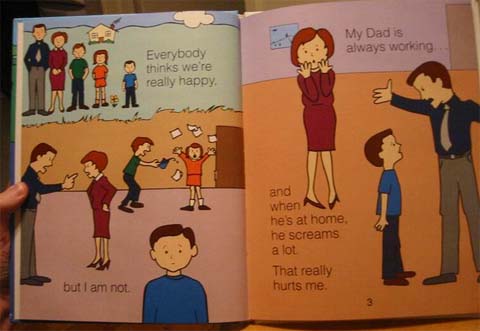
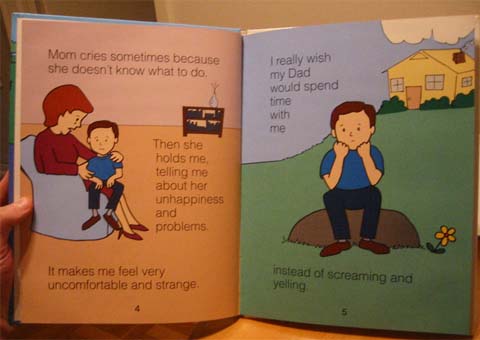
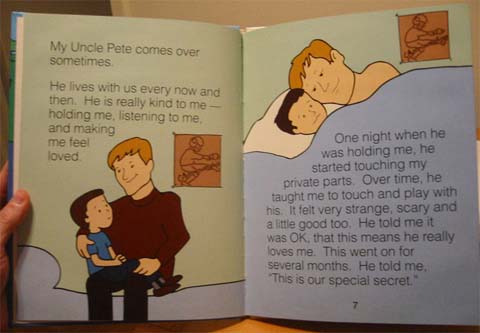


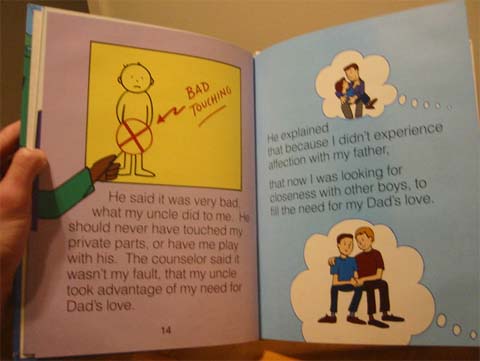

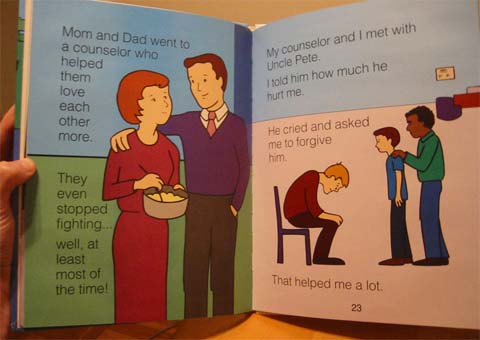
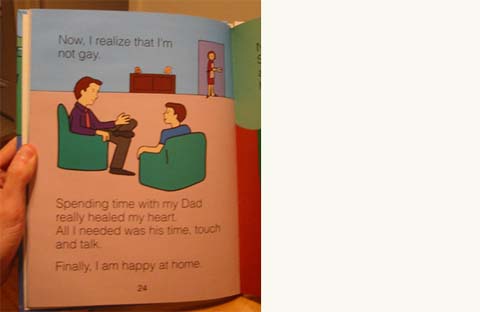



what if the narrator was female?
How would the story even make sense? Did you even read the article?
child molesting victims can be either sex
Your browser filters out italics or the word “gay”?
You need to turn off the filter for these words too:
“Sissy,” “Faggot,” “Queer,” “Homo.”
“This theory of absent father and too-close mother as a “cause” of homosexuality has long been shown to be bunkum.”
Once we accept that men liking other men as no more immoral than men liking women with big breasts – why should the cause matter?
Please note that Yawning Bread has a strict policy against hate speech in comments.
Dear Alex,
Perhaps the post was lost, but I asked the question in all seriousness. And so I pose it again: what happened to the vaunted right to offend?
Regards,
SN
The right to offend is extinguished when there is malice.
When A expresses an opinion that has some grounding in objective fact, reasonable logic, or aesthetic value, in furtherance of an idea, and B finds himself offended by the aesthetic or the idea, A should have a right to express himself. Even so, he may not express himself on the property of B, unless B so indulges him. A has a right to express himself either in the public sphere or on his own property.
If what A says is largely motivated by malice (which can be presumed from the way such expression targets a person or a group of persons, and is without some grounding in objective fact, reasonable logic, aesthetic value), that malice cannot be a protected right.
So, when P conjures up wild caricatures of a group of people that Q is identified with, in a manner that defames the group and lowers others’ estimation of them, P does not enjoy any right to offend, because a fair assumption can be made that P is motivated by a desire to denigrate and injure.
The argument is the same as this: You have the freedom to do what you want until you injure. Then that freedom ends.
“motivated by malice”, “grounding in objective fact”, “reasonable logic”, “aesthetic value”.
Who decides whether these obtain in specific cases?
Quoting Stanley Fish (out of context):
…valuing process over substance is the essence of liberalism, a form of thought and political organization that begins with a strong sense of the intractability of disputes at the level of belief and proceeds to turn everything it can into a question of procedure: Were all voices heard? Was the decision made on neutral grounds and without taking into considerations matters of race, gender, economic status, ethnicity, etc.? (Sounds good, doesn’t it?) Kant showed the way when he observed that “men have different views on the empirical ends of happiness . . . and their will cannot be brought under any common principle . . . harmonizing with the freedom of everyone.’”
The solution? Remove beliefs from the political agenda — we’re not going to vote on them or distribute goods on their basis — and come up with a formula for keeping them at bay while respecting the rights of citizens to have them. Kant again: “In order to organize a group of rational beings who together require universal laws . . . but of whom each separate individual is inclined to exempt himself from them, the constitution must be designed in such a way that the public conduct of the citizens will be the same as if they did not have such evil attitudes.” And how do you do that? By making it a requirement that laws neither reflect the ideological view point of one party nor marginalize and/or stigmatize the ideological viewpoint of some other party. Only pass laws to which persons of any viewpoint could assent: “No one can put anyone else under a legal obligation without submitting simultaneously to a law which requires that he can himself be put under the same kind of obligation by the other person.”
Who decides? On Yawning Bread, I do. It’s my private property.
In the public domain, the courts do.
“In the public domain, the courts do.”
Exactly my point. Calling what the courts decide as determinant for “motivated by malice”, “grounding in objective fact”, “reasonable logic”, “aesthetic value” – you dress it up and that needs to be called out.
More starkly, is there any strongly held belief where the one holding it does not think it is “grounded in objective fact”, “reasonable logic”, “aesthetic value” and that any criticism of it is “motivated by malice”?
The solution: public institutions should avoid getting involved as long as these stay in the written and verbal realm of the public space.
The Rachel Maddow Show did a piece last week on Mitt Romney’s charity donations. If you watch the following clip you’ll see Richard Cohen in action 1 minute into the segment(I almost died from laughter when I saw his “therapy” session):
She also conducted a pretty good interview with Cohen a couple of years ago. I managed to find the clips:
Part 1: http://www.youtube.com/watch?v=L2Pg22ow1e8
Part 2: http://www.youtube.com/watch?v=h7SVBd8KcaE&feature=related
I LOL a bit when counselor cure the gay out of him, the annoying quarrelsome out of his parents and pedophilia out of his uncle. So much truth in it pssssssssst 😀
Re the last picture, it’s too bad that there actually isn’t a hell for these people to go to. And in this life, their hate speech is apparently protected by the US law.
I think the story book also conflates homosexuality with pedophilia.
I think it’s really great that you took the time to dissect the book and give your opinions on it.
Must be done by a psychologists’ lobby group to get more business.
I hate my father I can never have close relationship with him, he think he did a good job just because all the money is coming from him. My parents are divorced because my father is a piece of shit and he isn’t happy with just one wife, he wants to marry another women. I love my mom there is no dad for me just mom. I’m jealous every time I see a fun, close and awesome relationship of my friends with their dad. I am 21 now and I like men, I am gay and this isn’t something I can get rid of.
Is this a send-up of:
“This theory of absent father and too-close mother as a “cause” of homosexuality has long been shown to be bunkum. “
In case anyone wants to make an esoteric argument about how freedom of speech should allow hate speech, or about the right to offend, here’s a snippet from the Economist magazine, 4 Feb 2012, Islam and homosexuality: Straight but narrow.
Quote
ONE leaflet showed a wooden doll hanging from a noose and suggested burning or stoning homosexuals. “God Abhors You” read another. A third warned gays: “Turn or Burn”. Three Muslim men who handed out the leaflets in the English city of Derby were convicted of hate crimes on January 20th. One of them, Kabir Ahmed, said his Muslim duty was “to give the message”.
Endquote
If lots of people in a civilised place like Britain, having put their minds together and come up with laws that define hate speech that way, if police, lawyers and judges who would have spent time thinking about the issue as it plays out in real life, come to similar conclusions and give substance to such laws, I think, as a rough and ready guide, it is a good enough reference for me in governing this blog.
Dear Alex,
Speaking politically, I agree that there are or must be limits to free speech. In other words, there are merits to the argument that free speech should not encompass the right to offend. To restate the matter, there is such a thing as hate speech, which speech the laws must debar.
I raised my initial question only because elsewhere you defend the right to offend. Personally I find it inconsistent for one to cower behind the provisions against hate speech when offended, and brandish the right to offend when it suits one’s purpose.
That is all.
Regards,
SN.
There is a right to offend; I didn’t say there isn’t. But that right does not extend to or protect all kinds of offensive speech. The kind that is in the nature of hate speech is outside the limit.
Oh wow. So I am gay because my uncle molested me and I’ve got daddy issues. Oh wait. I’m gay because I just am. I’ve had a fairly normal upbringing, I’m happy and I get along great with my family and I have never been bullied. I have no control over the gender I was born with just like I have no control over the gender I chose to love. I was raised in a southern baptist chuch and this book is a load of crap. I think it would make great toilet paper though.